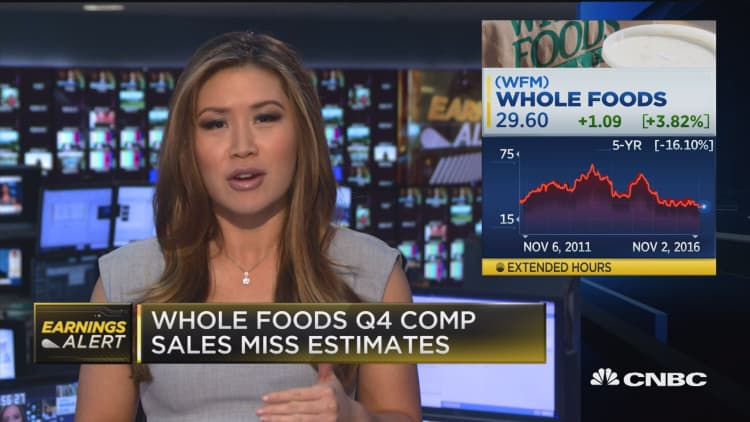
Whole Foods Market management said the grocery industry remains "very tough" and despite growing its new 365 by Whole Foods value-focused stores, the company insisted there was a limit to embarking on any deeply discounted program.
"Promotions and price investments are an integral part of our conversation but we are not participating in a race to the bottom," said John Mackey, co-founder and co-CEO of Whole Foods on the company's fiscal fourth-quarter earnings call Wednesday.
The company's earnings and sales growth has been challenged as it faces competition from conventional supermarket chains as well as lower-cost competitors such as Sprouts Farmers Market.
Speaking on Wednesda'y call, Mackey also cited more competition from fresh food delivery service Amazon as well as meal kit companies such as Blue Apron, Hello Fresh and Plated.
"It's a very competitive market out there," he said. "Everybody's feeling it."
Mackey insisted Whole Foods would do better by sticking with its strategy focusing on "leading a race to the top in terms of a differentiated customer experience, continuing to raise the bar in our quality standards and selection. We believe we have the right strategies in place to position the company to produce strong results and returns for our shareholders over the long term."
At the same time, the Texas-based company said it was encouraged by the early performance of its smaller-format 365 stores but also was planning to make some changes.
Financial analysts have said the 365 store format offers growth potential for Whole Foods, but also raises the risk of cannibalization of the company's existing store base. For example, the 365 store in Silver Lake — the company's first location of the new format — is located about four miles from a Whole Foods store in Glendale, California. And a 365 location in Bellevue, Washington, is less than two miles from the larger Whole Foods store.
Indeed, management was asked about cannibalization in the Bellevue market.
"Cannibalization is lower in Bellevue than we had anticipated," said David Lannon, executive vice president of operations for Whole Foods. "We see the customers are seeing them as two separate choices — and, or shopping at both."
The exec also said it was "still early days" for the 365 format and the company was "making adjustments and tweaks to make sure we perfect '365' before we really hit the gas on new store openings."
The company has a total of three of the 365 stores currently open and 19 more in development nationwide.
Overall, Whole Foods opened five new stores in the fiscal fourth quarter ended Sept. 25. That compares with 12 new stores it opened in the prior quarter, including the 365 store in the L.A. market. Two of the five outlets opened in the latest quarter were 365 stores.
Whole Foods also commented on food costs, indicating that seafood and avocados were two categories where they experienced big increases in the quarter.
"Early in the quarter we were definitely seeing some deflation," said A.C. Gallo, president and COO of Whole Foods. However, as the quarter went on he said there was an uptick in certain categories, including farm-raised salmon, which showed a "dramatic increase at the end of the quarter." He also cited "some produce items, specifically avocados," as a result of a disruption in the harvest in Mexico.
Meantime, Whole Foods announced Wednesday its co-CEO Walter Robb would be leaving his job as part of a new structure that will do away with the co-CEO title; he will continue as a board member. With the change, Mackey will return as the company's sole CEO.
In the fiscal fourth quarter, Whole Foods reported earnings per share of 28 cents, up 75 percent from 16 cents per share a year ago. That exceeded the Street's average estimate for EPS of 24 cents, according to a survey by Thomson Reuters. Sales were up 2 percent to a record $3.5 billion.
Whole Foods also predicted diluted EPS in fiscal 2017 will be "$1.42 or greater" per share. The guidance excludes any potential share repurchases. The full-year estimate compares with the analysts' forecast for earnings of $1.47 per share, according to Thomson Reuters.
Whole Foods hasn't produced positive quarterly comps in over a year. Comparable-store sales in the latest quarter were down 2.6 percent, which is slightly worse than analysts' forecast for a 2.1 percent decline, according to Consensus Metrix.
Whole Foods shares were recently trading up 3.7 percent in after-hours trading Wednesday. In September, the stock touched its lowest level since August 2011.


